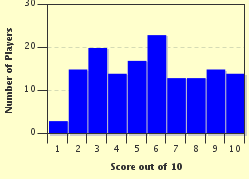Quiz Answer Key and Fun Facts
1. "A man saw a ball of gold in the sky;
He climbed for it,
And eventually he achieved it --
It was _____."
What completes the first stanza from this poem by Stephen Crane?
2. "I shall be telling this with a sigh
Somewhere ages and ages hence:
Two roads diverged in a wood, and I,
I took the one less traveled by,
And that has made all the difference."
By whom was this concluding stanza written, and what is the title of the poem?
3. "All your friends will leave you
All your friends will die
So lead a clean and wholesome life
And join them in the sky."
Choose the correct title that describes to whom Ernest Hemingway is giving advice in this poetic excerpt.
4. "Flow down, cold rivulet, to the sea,
Thy tribute wave deliver:
No more by thee my steps shall be,
For ever and for ever."
Thus begins a poem about the ephemerality of life... by whom was it written, and what is the title?
5. "If you can talk with crowds and keep your virtue,
Or walk with Kings - nor lose the common touch,
If neither foes nor loving friends can hurt you,
If all men count with you, but none too much:
If you can fill the unforgiving minute
With sixty seconds' worth of distance run,
Yours is the Earth and everything that's in it,
And - which is more - you'll be a Man, my son!"
Who wrote this inspirational poem, entitled "If-"?
6. "Hope is the _____
That perches in the soul,
And sings the tune--without the words,
And never stops at all,"
Can you complete the opening line of this poem by Emily Dickinson?
7. "You may write me down in history
With your bitter, twisted lies,
You may tread me in the very dirt
But still, like dust, I'll rise."
Who authored this poem that so captured the struggle for racial equality in the American Civil Rights movement?
8. "Out of the night that covers me,
Black as the Pit from pole to pole,
I thank whatever gods may be
For my unconquerable soul."
This is the opening stanza of the powerful poem by William Ernest Henley. What is its title, a Latin translation of 'unconquered'?
9. "Spend all you have for loveliness,
Buy it and never count the cost;
For one white singing hour of peace
Count many a year of strife well lost,
And for a breath of ecstasy
Give all you have been, or could be."
What is the title of this poem by Sara Teasdale, that reminds us not to miss out on all that life has to offer?
10. "Take up our quarrel with the foe:
To you from failing hands we throw
The torch; be yours to hold it high.
If ye break faith with us who die
We shall not sleep, though poppies grow
In Flanders fields."
Spoken aloud at war memorial services around the world, who authored this wonderful poem?
Source: Author
reedy
This quiz was reviewed by FunTrivia editor
agony before going online.
Any errors found in FunTrivia content are routinely corrected through our feedback system.


